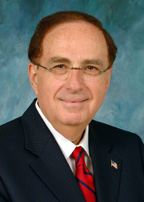Employee loyalty and satisfaction has long been an unwritten goal, but now it is etched into UNMC’s strategic plan.
Creating a campus culture that builds employee loyalty and satisfaction is the newest area of focus in UNMC’s 2002-2005 Strategic Plan, adopted May 7 by the Chancellor’s Council.
The plan builds on UNMC’s vision to become a world-renowned health sciences center by expanding its research and educational role, strengthening its campus/community partnerships, creating a culturally competent workplace, developing new health-related technologies and boosting employee loyalty and satisfaction.
|
|
“UNMC is successful because of its people,” said UNMC Chancellor Harold M. Maurer, M.D. “Each day, individuals across campus make a positive difference in this institution by doing their job and doing it well. To reach all of our goals, we must make UNMC the best it can be in terms of employee loyalty and satisfaction. Although it’s solid now, we can — and will — do better.”
In adopting the 2002-2005 Strategic Plan, the Chancellor’s Council highlighted 27 specific goals to accomplish during the 2002-2003 fiscal year. Each goal falls under one of six focus areas, commonly referred to as critical success factors. The six areas are:
- Enhance and expand the educational environment;
- Increase prominence as a research health sciences center;
- Advance community/campus partnerships for health;
- Create a culturally competent organization;
- Develop selected new technologies to advance health education, science and the Nebraska economy; and
- Create a culture that builds employee loyalty and satisfaction.
Each area of focus has specific one-year targets. Similar to past plans, campus leaders have been assigned accountability for each goal within the plan. Over the next year, they and their teams will work on a number of goals including strengthening efforts to enroll the best Nebraska students, securing approval from the Board of Regents for the Center for Health Science Education, becoming a leader in bioterrorism preparedness and increasing UNMC’s National Institutes of Health funding by 30 percent.
Other goals include developing a UNMC-wide e-grant application system, increasing the amount of external funding for minority health research, expanding UNMC’s diabetes-related activities to minority clinics and rural communities, developing a wellness initiative to combat obesity, improving the organizational climate to support cultural competence, becoming the health information resource of the Midwest and regularly assessing employee satisfaction.
“Each year we review and revise the strategic plan to build on the success of last year’s plan,” said John Adams, director of strategic planning and budget. “We adopt new goals and extend or modify existing goals to reflect and support our vision for UNMC.”
To help support the vision, the Chancellor’s Council also has approved a Mission Critical Infrastructure Plan to develop UNMC’s facilities, information technology and administrative systems. The five action steps include developing a campus/neighborhood traffic plan consistent with campus development, strengthening regulatory compliance and establishing a coordinated UNMC/NHS safety and security plan.
UNMC planning information and quality indicators
To help evaluate its future performance, UNMC also has identified 11 key quality indicators. The indicators are available in the fourth edition of UNMC Strategic Planning Information, compiled by the Office of Budget and Analysis.
 “Many of these indicators reflect what we’ve been pursuing at the Medical Center through our strategic plan,” Dr. Maurer said earlier. “If we are to become a world-class academic health sciences center, and that is our goal, then we will need to be strong in each of these 11 areas.”
“Many of these indicators reflect what we’ve been pursuing at the Medical Center through our strategic plan,” Dr. Maurer said earlier. “If we are to become a world-class academic health sciences center, and that is our goal, then we will need to be strong in each of these 11 areas.”
The first six quality indicators are closely related to the campus strategic plan and are measured in terms of test scores, percentiles and dollars, Adams said. The final five quality indicators are harder to measure, but they provide the necessary support for teaching, research, patient care and community health, he said.
Intangibles in quality such as culture, commitment, morale, team spirit, trust and pride also are important for the medical center to excel, Dr. Maurer said.